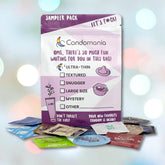Close
You're gonna love this...
Fleshlight Quickshot Riley Reid Open-Ended Masturbation Sleeve
1 review
Introducing the Quickshot Riley Reid: Your Ticket to Pleasure Paradise! Get ready to embark on a pleasure-packed journey like no other with the Quickshot Riley Reid! 🎉 Experience Sensational Pleasure: Riley Reid Style! Slide into an adventure as you indulge in the two heavenly...
- Regular price
- $39.95
- Regular price
-
$44.99 - Sale price
- $39.95
- Unit price
- / per
Ultra Thin Condom Sampler
17 reviews
Ultra Thin Condom Sampler Pack These condoms are your golden ticket to this world of pleasure. Handpicked by the connoisseurs at Condomania, this sampler pack is a treasure trove of both well-known and hidden gem brands. We believe that variety is the spice of life, especially...
- Regular price
- From $12.99
- Regular price
-
$18.99 - Sale price
- From $12.99
- Unit price
- / per
Fleshlight Riley Reid Utopia: Realistic Male Masturbator Sleeve
No reviews
Fleshlight Girls: Riley Reid Utopia Welcome to Utopia, Condomaniacs—Riley Reid style 😏. This Fleshlight is as close as it gets to spending a night with the queen of charm herself. With its ultra-detailed molding and Riley’s signature warmth, this sleeve turns every solo session...
- Regular price
- $79.99
- Regular price
-
$89.99 - Sale price
- $79.99
- Unit price
- / per
TENGA Spinner Penis Stroker | 'Pixel' 04
19 reviews
Tenga Spinner "Pixel" Reuseable Spiral-Motion Male Masturbator If you're looking for your new best friend, look no further than the Tenga Spinner "Pixel" Male Masturbator. The inside of the Tetra Pixel is uniquely fitted with a spiral of delicate enveloping nodes for a unique masturbation experience. Amazing for...
- Regular price
- $25.99
- Regular price
-
$29.99 - Sale price
- $25.99
- Unit price
- / per
Satisfyer Pro 2 Next Generation
No reviews
Satisfyer Pro 2 Next Generation – The Clit Whisperer 💦 Let’s just say this little beauty doesn’t mess around. The Satisfyer Pro 2 is here to suck, pulse, and totally blow your mind—in the best way possible. It uses pressure waves (not vibrations!) to...
- Regular price
- $49.99
- Regular price
-
$69.95 - Sale price
- $49.99
- Unit price
- / per
Product Results
There are no products listed for
- Choosing a selection results in a full page refresh.









